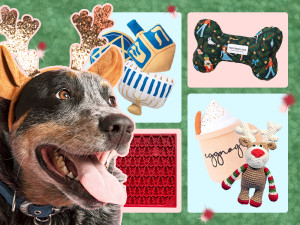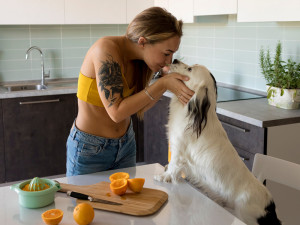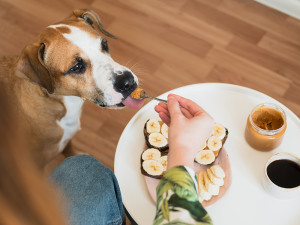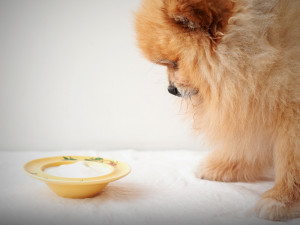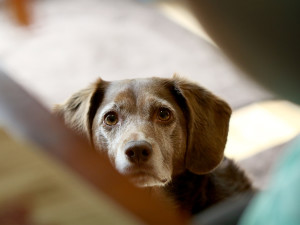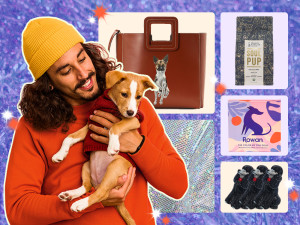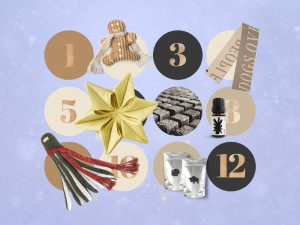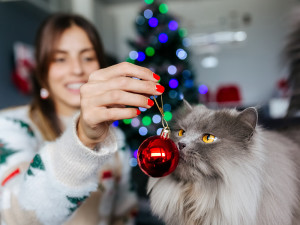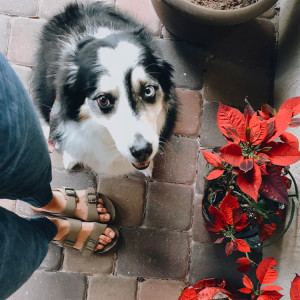Which Christmas Foods Can My Dog Eat?
From turkey to mince pies, Brussels sprouts to parsnips, find out which festive foods it’s safe to sneak your pup from the table

share article
The tree is up, the fairy lights are sparkling and you’ve ordered the turkeyopens in a new tab – Christmas is officially around the corner. It’s the time of year for families and friends to exchange giftsopens in a new tab, sip mulled wine and gather around the table for a delicious festive feast.
But what about our favourite four-legged family members? You may have already purchased a squeaky Santa for your dog to unwrap but if you’re anything like me, you can’t help but feel that their everyday dog food seems a bit bland for Christmas Day.
Sure, there are some special Christmas treats and limited edition dog food available but the real question is whether it’s possible to plate up some of your traditional turkey dinner for your furry friend. Or, perhaps it’s too late – your dog has already eaten a plate of stuffing while your back was turned and now you’re freaking out about whether or not it was safe for them to eat.
Whatever the case, with the help of expert vet Dr Kate McCrossan, a veterinary surgeon practising in Northern Ireland, we’ve put together a guide to what dogs can and definitely cannot eat this Christmas.
Can dogs eat turkey?
Turkey, the star of the festive show can be a healthy meat and a great source of protein for your dog. It’s often the primary ingredient in dog food due to its rich nutrients, including riboflavin and phosphorus.
However, it tends not to be coated with skin, salt, pepper and gravy in dry dog food. Roasting a turkey as we usually do in butter, oils and seasoning makes it a rich and fatty food that has the potential to cause digestive upset for dogs.
So, how can we share turkey with our dogs? “If you want to feed your dog a small amount of turkey to satisfy their craving without giving them too many extra calories, stick to the plain, skinless white meat pieces free of seasonings and gravy,” says Dr Kate.
“While both white and dark meat portions of a turkey aren’t toxic for dogs, dark meat and turkey skin have high fat content. Feeding your dog plain, white meat is a better protein source and it also avoids the risk of an upset pancreas, which can lead to severe health concerns,” adds Dr Kate.
You can also repurpose turkey giblets by slicing them into bite-sized bits for your dog, steering clear of the turkey neck due to its small, potentially hazardous bones. Despite the classic idea of giving dogs bones, it’s a risky move. Bones often splinter, posing a choking hazard or worse, the chance to puncture your dog’s digestive tract. So, let the humans handle the wishbone this year.
Can dogs eat stuffing?
If plating up a dog’s Christmas dinner, it’s essential to leave the stuffing out. Although delicious, the usual spices, butter and additional ingredients are too rich for dogs.
“Onions, garlic, leeks, shallots and chives all belong to the allium family and can be found in most types of Christmas stuffing. These plants contain a compound that can damage a dog’s red blood cells and can cause life-threatening anaemia or gastroenteritis,” says Dr Kate.
If your dog has consumed foods with onions or other allium family members, consult your veterinarian for guidance. Symptoms of poisoning may not immediately show, so seeking advice is crucial even if your dog appears unaffected.
Can dogs eat roast potatoes?
Roasted, baked, fried, mashed... what were we talking about again? There are many delicious ways to enjoy potatoes but can our dogs enjoy them as much as us? Well, the answer depends on how you’re cooking them.
“Dogs can eat potatoes as long as they’re plainly cooked and offered in moderation. Roasted potatoes, prepared without spices, butter or salt are the best way to let your dog enjoy this part of the dinner. It’s best to avoid raw or boiled potatoes as they contain solanine which is not safe for dogs,” says Dr Kate.
Can dogs eat parsnips?
Good news – parsnips are safe and good for dogs. “When consumed in moderate amounts, these root veggies are a wonderful source of fibre, and this will result in your dog feeling fuller for longer,” says Dr Kate.
Gently cooked, peeled parsnips are the best way to feed them to your dog. Although raw parsnips aren’t toxic, they can be difficult to digest and a potential choking hazard. If you don’t know by now, dogs and seasoning don’t mix, so avoid adding that delicious honey glaze or salt and pepper for now.
Can dogs eat mince pies?
Mince pies are a definite no go for your dog at Christmas. The mincemeat is made up of dried fruit that contains raisins, sultanas, currants and grapes, which are all toxic to dogs and can lead to acute kidney failure. Even a tiny amount can cause severe problems in some dogs.
As well as containing toxic dried fruit, mince pies often contain lots of fat and sugar in the pastry, which may cause stomach upset in dogs.
“If your dog happens to find the mince pies and devours them in one, call your vet as soon as possible. They may ask you to bring in a sample of the packaging of the mince pie and will advise next steps,” says Dr Kate.
The good news is that if you want to get your pet into the festive spirit, there are dog-friendly mince pies available in some pet stores and supermarkets.
Can dogs eat chocolate?
Chocolate is probably the most well-known toxic food for dogs. “Chocolate contains theobromine, a chemical which is similar to caffeine. Dogs are particularly sensitive to theobromine and it can be poisonous to them. Theobromine can make dogs unwell in a number of different ways, but its main effect is to cause an overstimulation of their muscles, including their heart,” says Dr Kate.
If your dog does consume any chocolate, contact your vet as soon as possible. It can be helpful to know what type and how much chocolate your dog has consumed.
Your dog may be OK if they eat a small amount of chocolate, and if they are a larger dog, they usually can tolerate more. The darker and more expensive chocolates usually have more theobromine and are more likely to be harmful to dogs.
Can dogs eat cheese?
If you’re nibbling at a cheese board on Christmas Eve and your dog is giving you the eyes, it is safe to treat them with a little bit of cheese. While certain cheeses such as cottage cheese, mozzarella, parmesan, Swiss and cheddar are OK for dogs to have nibbles of due to their lower fat content, some cheeses should be avoided.
Cheese can carry some benefits for your dog, it contains protein, calcium, vitamin A, essential fatty acids and B-complex vitamins. These are all beneficial to your dog’s health, as long as too much isn’t ingested.
“However, blue cheeses, or those with herbs, garlic or other add-ins should be avoided. Goat cheese, brie and feta all have high levels of saturated fat, which makes them unhealthy for dogs to consume,” says Dr Kate.
If your dog gets an upset stomach easily, cheese may cause sickness or diarrhoea. If you are not sure if your dog can handle cheese, try giving them a small amount. If they react poorly, avoid giving them cheese in the future. Some dogs can actually be lactose intolerant and will feel very sick if they eat cheese.
Can dogs eat Brussels sprouts?
“Yes, dogs can eat Brussels sprouts, but they should be cooked and served in moderation,” says Dr Kate.
Some dogs (and many humans) may not like the bitter taste of Brussels sprouts but it is safe to add one to their dish. Never feed your dog raw Brussels sprouts as they can cause digestive issues.
Overall, dogs can enjoy a few nibbles of plain turkey, parsnips, certain cheeses and a few roast potatoes at Christmas. Avoid giving your dog any seasoning or toxic ingredients such as onion, garlic or chocolate, and warn any dinner guests not to give the dog a bone.
So, if you want to plate up something special for your dog this Christmas, now you know exactly what they can enjoy. Although it might be best to buy a few extra dog treats if you have any doubts about the human food.
One final note from Dr Kate: “Dogs that have long-term illness or health conditions may not tolerate any diet changes so it’s best to treat them with a new toy instead. It’s also important to discuss any diet changes with the vet if your dog is on a prescription diet.
“Of course, if you are getting a new toy for Christmas, supervise your dog just in case they dismantle it to pieces and swallow some of the plastic.”
No one wants a trip to the vet at Christmas so make sure to keep an eye on all furry
members of the family.
Note: while caution was taken to give safe recommendations and accurate instructions in this article, it is impossible to predict an individual dog’s reaction to any food or ingredient. Readers should consult their vets and use personal judgement when applying this information to their own dogs’ diets.
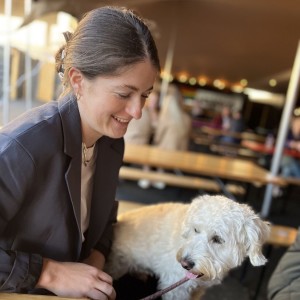
Nuala McHugh
Nuala is a writeropens in a new tab with a background in PR. She has worked with brands including Jollyes, Universal Studios, and Amazon. Based in Northern Ireland, she is now doing what she loves most: writing with her clingy cockapoo Bobby by her side.
Related articles
![Five fun holiday ornaments of pets in various costumes hanging from Christmas tree boughs against a sparkly silver background]() opens in a new tab
opens in a new tab15 Pet-Inspired Christmas Decorations Worth Pride of Place on Your Tree
Your love for your pet is evergreen, so hang an ornament of their likeness on your Christmas tree this year
![brown dog begging for food at table]() opens in a new tab
opens in a new tabHuman Foods Toxic to Dogs – From A–Z
Even if they ain’t too proud to beg
![holiday gift guide for dog lovers]() opens in a new tab
opens in a new tabThe Best Christmas Gifts For Dog Parents
Being a dog parent is hard work, so let’s make it a little easier
![Numbered circles and assorted pet treats and toys for an advent calendar set on a periwinkle blue snowy background]() opens in a new tab
opens in a new tab9 Whimsical Advent Calendars Just for Pets
Super-festive options for dogs and cats who deserve a daily Christmas treat
![A woman in a fun Christmas sweater with bright red nails holding a shiny red Christmas tree ornament in front of her grey cat]() opens in a new tab
opens in a new tabHow to Stop Your Cat From Using Your Christmas Decorations to Torture You
There is a way to keep these Christmas chaos demons at bay – here are some tips
![Large black and white dog sitting next to Poinsettia plants.]() opens in a new tab
opens in a new tabAre Poinsettias Toxic For My Dog?
Everything you need to know about the notorious plant
